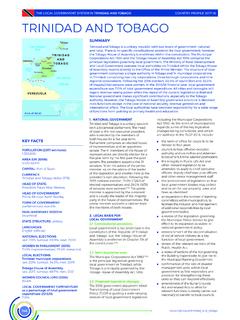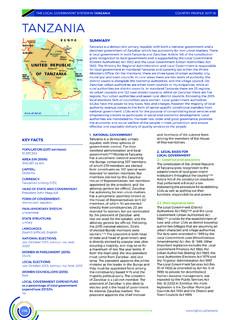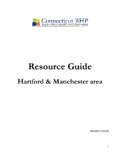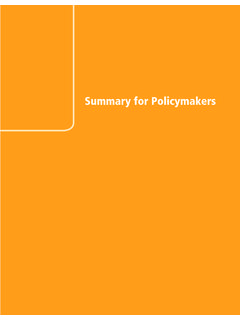Transcription of The Constitution of Zimbabwe 2013 as a basis for local ...
1 strengthening Capacity for local Governance and Service Delivery in Zimbabwe Project The Constitution of Zimbabwe 2013 as a basis for local government transformation: A Reflective Analysis Supported by European Union ii | P a g e Forewords In taking its research agenda forward Midlands State University (MSU) local governance department partnered with the Commonwealth local Government Forum (CLGF) to debate the inclusion of local government in the Constitution of Zimbabwe 2013. The implications of local government constitutional provisions have not been fully debated hence the gap that MSU and CLGF sought to close through debate leading to this edited volume. The debate recognised limited progress in implementing relevant provisions of the Constitution particularly the core ideals of devolution which remain contentious suggesting need for an implementation framework and plan.
2 Such a framework would guide reforms of relevant administrative structures and relations. Currently these remain unchanged and thus constitute an implementation drag. The dragging is seen in re-centralisation of local authority functions and spaces suggesting that the devolution agenda is not yet fully institutionalised. Changes in local government now require a constitutional rather than legislative changes and policy directives. The right to govern, the right to services and space for citizen participation are provided for in ways that usher a new dispensation for both national and local governance. local government constitutionalisation is accompanied by a guaranteed sharing of national resources (at least 5%) between the national and sub-national tiers of government.
3 Contributions in this volume provide an in-depth understanding on the constitutional provisions on local government and search for trajectories critical for entrenching the mechanisms needed to implement and optimise those provisions. Much of the discussion on local government constitutionalisation has hitherto been limited to realignment of laws. It did not engage with deeper governance transformations anticipated in the Constitution . As such, this paper teases out key questions and reflects on possible avenues for making the Constitution live. The paper generates preliminary yet foundational knowledge to guide further debate and practical processes needed for local -national constitutionalism post 2013. Important governance issues need not continue to be usurped by party political actors and interests.
4 More empirical research on how the constitutional provisions can be a factor in local governance is required to further inform the implementation of local government constitutionalisation. Professor K. H. Wekwete, Pro-Vice Chancellor, Business Development and Administration, Midlands State University The significant role of local government as a democratic arm of government, providing core services and enabling inclusive local development, is increasingly being recognised in national Constitutions around the world. In 2013 the Constitution of Zimbabwe was adopted with a section relating to devolution. The debate as to how this should be interpreted on the ground is on-going, and this document provides an understanding of the constitutional provisions for devolution, addresses the need for legal change and suggests strategies for making the new provisions real in the way in which the state functions.
5 The report is the result of an extensive period of research by partners at Midlands State University, and it has been prepared to support work which CLGF and a broad cross-section of partners are taking forward, with funding from the European Commission, to strengthen the role of citizens in service delivery in Zimbabwe . The findings will be debated by the local government associations and their membership, as well as other stakeholders, and will guide debate and advocacy in efforts to strengthen local governance and put people at the heart of local development. CLGF would like to thank colleagues at Midlands State University for their extensive contribution to such a critical debate. Dr. Greg Munro Secretary-General, Commonwealth local Government Forum iii | P a g e Acronyms ACBF: African Capacity Building Foundation; ACRWC: African Charter on the Rights and Welfare of the Child; ARDCZ: Association of Rural District Councils of Zimbabwe ; AU: African Union; BPRA: Bulawayo Progressive residents Association; CALR: Centre for Applied Legal Research; CASS: Centre for Applied Social Sciences, University of Zimbabwe ; CBO: Community-Based Organisation; CCDZ: Centre for Community Development in Zimbabwe ; CCMT: Centre for Conflict Management and Transformation; CEDAW: Convention on the Elimination of Discrimination against Women; CHRA: Combined Harare Residents Association; CLGF: Commonwealth local Government Forum; CPIA: Centre for Peace Initiatives in Africa.
6 CRC: Convention on the Rights of the Child; CSOs: Civil Society organisations; DEAP: District Environmental Action Programme; DEGI: Development Governance Institute; DFID: Department for International Development (UK Government); ECDPM: European Centre for Development Policy and Management; EFZ: Evangelical Fellowship of Zimbabwe ; ESAP: Economic Structural Adjustment Programme; EU: European Union; FBOs: Faith-Based Organisations; GNU: Government of National Unity; HTF/HDF: Health Development/Transition Fund; ICLD: International Centre for local Democracy; IDEA: Institute for Democracy and Electoral Assistance; IDZ: Institute of Development Studies; IGR: Inter-Governmental Relations; IRBM: Integrated Results-Based Management; IRWSSP: Integrated Water Supply and Sanitation Programme; LED: local Economic Development; LG: local Government; LGCCBDT: local Governance Community Capacity Building and Development Trust; MDC: Movement for Democratic Change (party); MDP: Municipal Development Partnership; MICS: Multiple-Indicator Cluster Survey; MISA: Media Institute of Southern Africa; MOU: Memorandum of Understanding; NCA: National Constitutional Assembly; NGO: Non-Governmental Organisation; NUST: National University of Science and Technology; OPC: Office of the President and Cabinet; OVC: Orphan and Vulnerable Children; PAC: Partnership Africa Canada; iv | P a g e POSA: Public Order and Security Act; PPPs: Public-Private Partnerships; PVOA: Private Voluntary Organisations Act.
7 RAU: Research and Advocacy Unit; RDC: Rural District Council; SADC: Southern Africa Development Community; SNV: Netherlands Development Organisation; TILCOR: Tribal Trust Land Development Corporation; UCAZ: Urban Councils Association of Zimbabwe ; UDCORP: Urban Development Corporation; UK: United Kingdom; UN: United Nations; UNDP: United Nations Development Programme; UNICEF: United Nations Children s Fund; US: United States of America; VIDCOs: Village Development Committees; VNG: Association of Dutch Municipalities; WADCOs: Ward Development Committees; WiPSU: Women in Politics Support Unit; WOZA: Women of Zimbabwe Arise; ZANU PF: Zimbabwe African National Union-Patriotic Front (party); ZAPU: Zimbabwe African People s Union (party); ZBC: Zimbabwe Broadcasting Corporation; ZCBC: Zimbabwe Catholic Bishops Conference; ZCC: Zimbabwe Council of Churches; ZCTU: Zimbabwe Congress of Trade Unions; ZILGA: Zimbabwe local Government Association; ZIMSTAT: Zimbabwe Statistics Agency; ZINARA: Zimbabwe National Road Authority; ZINWA: Zimbabwe National Water Authority; ZIPAM: Zimbabwe Institute of Public Administration and Management; ZLHR: Zimbabwe Lawyers for Human Rights; ZUM: Zimbabwe Unity Movement (party); v | P a g e Table of Contents Executive Summary.
8 1 Chapter 1: Introduction .. 3 Chapter 2: Constitutionalism and local Government in Zimbabwe .. 8 Chapter 3: Insights from the Constitution -Making Process and their Implications for local Government Development .. 15 Chapter 4: The Preparedness of National Institutions for Devolution in Zimbabwe with respect to Selected Services: An Analysis and Some Proposals for Making Devolution Work .. 17 Chapter 5: local Government Institutions Readiness to Live the Constitution .. 25 Chapter 6: Non-state Actors and local Government Relations in the new Constitutional Era .. 33 Chapter 7: Service Delivery in an Era of Rights .. 40 Chapter 8: Developing the Capacities of local Government in Zimbabwe . What Changes After Constitutionalisation? .. 48 Chapter 9: Conclusion and some suggestions for next steps.
9 57 Bibliography:..59 Contributors Chapter 1: Kudzai Chatiza, Director, Development Governance Institute (DEGI), Zimbabwe Chapter 2: Kadmiel H Wekwete Pro Vice Chancellor Business Development and Administration, Midlands State University Chapter 3: July Moyo, Senior local Government Expert with years of Government of Zimbabwe experience as well as international senior advisory expertise in Sub-Saharan Africa Chapter 4: Kudzai Chatiza, Director, Development Governance Institute (DEGI), Zimbabwe and Angeline Sithole, Lecturer, Midlands State University, Dept. of local Governance Studies Chapter 5: Stephen Chakaipa, Lecturer, Midlands State University, Dept. of local Governance Studies and Vincent Chakunda, Lecturer, Midlands State University, Dept. of local Governance Studies Chapter 6: Edson P.
10 Mutema, Lecturer, Midlands State University, Dept. of local Governance Studies Naome Rajah. Lecturer, Midlands State University, Dept. of local Governance Studies and Kudzai Matsika, Lecturer, Midlands State University, Dept. of local Governance Studies Chapter 7: Virginia Makanza, Lecturer, Midlands State University, Dept. of local Governance Studies and Patrick F. Banga, Lecturer, Midlands State University, Dept. of local Governance Studies Chapter 8: Kudzai Chatiza Director, Development Governance Institute (DEGI), Zimbabwe and Virginia Makanza, Lecturer, Midlands State University, Dept. of local Governance Studies Chapter 9: Kudzai Chatiza Director, Development Governance Institute (DEGI), Zimbabwe 1 | P a g e Executive summary This report attempts to fill the knowledge gap regarding understanding of local governance constitutional provisions and Chapter 1 presents the context in which these can be a factor in the development of good local governance.












